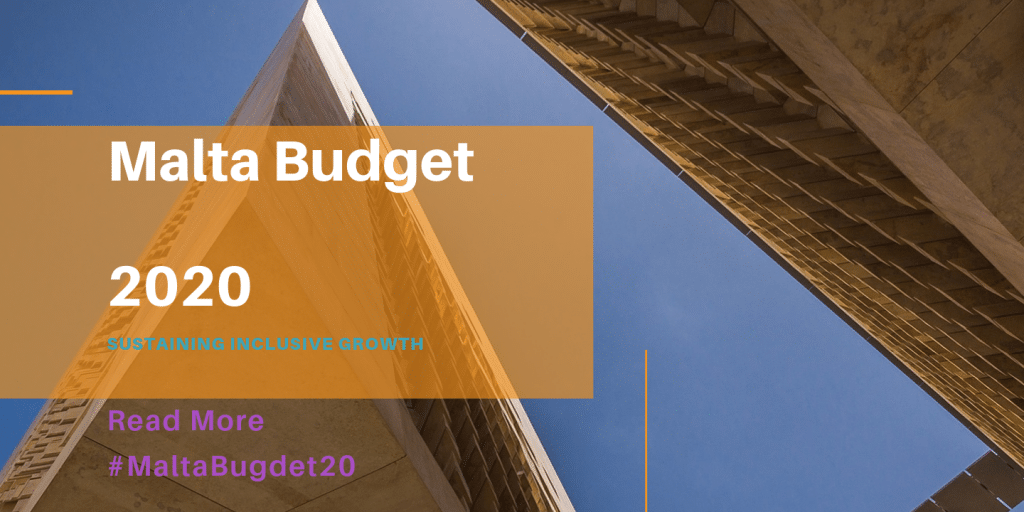Yesterday evening, the 14th October 2019, Malta Finance Minister Hon Profs Edward Scicluna laid out the plans of the Government for 2020.In the first semester of 2019 the Maltese economy has grown at a rate of 4.7%, more than three times the average rate of growth of 1.4% for the European Union. The government is looking to close the year 2020 with a financial surplus of 1.4 % of GDP. The Budget announced no new direct taxes. Several social measures were introduced including: an additional day of leave, the cost of living allowances will increase to €3.49 per week, increases in bonuses, a new bonus for every new-born or adopted child, increase in allowances, and enhances sickness benefits and disability assistance. Notable positives are the introduction of measures which target anti-money laundering and tax evasion in view of the MoneyVal report and also measures to promote environmental sustainability.

BREAKDOWN OF MALTA’S 2020 BUDGET
Property-related measures
- the Government will be financing the 10% deposit (up to €17,500) through an interest free loan and repayable over a 15-year period to certain individuals under 40 years of age
- the first €100,000 of any profits or gains arising on the assignment or cessation of any rights acquired under a promise of transfer of immovable property or any rights thereon will be subject to a reduced tax at the rate of 15%; profits or gains exceeding €100,000 will continue to be subject to tax at 35%
- the stamp-duty exemption for First-Time Buyers of immovable property will now apply on the first €175,000 of the value of the property (previously €150,000)
- the reduction or refund of stamp duty on the purchase of a new residential home for Second-Time Buyers is extended, in Gozo (reduced from 5% to 2%) and in Urban Conservation Areas (reduced from 5% to 2.5%)
- the reduced rate of 3.5% on inherited immovable property being the residential property of the heirs now applies on the first €175,000 of the value of the property
- the reduced duty rate of 1.5% on certain intra-family transfers of business property and securities has been extended
- the property rental subsidies introduced during 2019 shall be extended such that, subject to other conditions, individuals earning annual income of not more than €19,000 (up from €14,500) and couples with two children earning annual income of not more than €32,000 (up from €28,600) can avail themselves of this subsidy
- a new authority shall be established to further supplement regulatory reforms to the construction sector
Income tax
- the first 100 hours of overtime in relation to employees with a basic salary of not more than €20,000 (and not in a managerial post) will be taxed at 15%
- tax refunds to employees earning less than €60,000 shall be extended, the refunds will vary between €40 and €68 depending on the level of income and tax status of the employee
- the maximum amount of exempt pension income will be increased to €13,798, and persons claiming to married rates will be entitled to an additional €2,000 tax free in respect of income from other sources
VAT and other taxes
- the VAT exemption on educational services shall extend to distance learning, and to vocational training or re-training by a school or institution recognised for this purpose
- extension of grants on the purchase of renewable energy battery storage, on the purchase of bicycles, electric bikes and motorcycles, and on the purchase of specialised apparatus bought for persons with disabilities
- investment in Customs to enhance security and to combat illicit activity and evasion of taxes and duties, including security and scanning processes
- cash payments for the purchase of property, cars, yachts, and diamonds exceed €10,000 will be prohibited to combat illicit activity and limiting evasion of taxes and duties
Green measures
- plans for a national strategy geared towards achieving carbon neutrality by the year 2050
- measures to improve waste management including the development of a new plant to convert waste to energy
- introduction of special electricity rates for individuals charging their electric car from their residence
- improvement of the public and alternative modes of transport including an increase in the number of buses, free school transport, free use of public transport for young people and elderly and extension of “on-demand buses”, incentives for investment in bicycle racks and eco-friendly vehicles, extension of scrappage schemes and grants in respect of vehicles converted from petrol to gas
- the importation and production of single-use plastics will be banned as from 2021 and the sale and distribution of plastic bags, cutlery, straws, and plastic plates will be banned as from January 2022
- cash incentive for the acquisition of new eco-friendly machinery in the construction industry
- measures to increase use of renewable energy sources, including solar panels, heat pumps and solar water heaters and a new subsidy of 25% of the cost (capped at €1,000) shall be introduced in relation to purchase of rechargeable batteries for renewable energy


